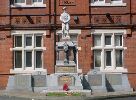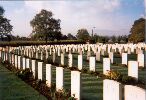
Newton-le-Willows and
Earlestown War Memorial

| OTHER WARS |
 |
Newton-le-Willows andEarlestown War Memorial |
 |
| The
Great War Roll of Honour |
|||||||||||||||||||||||||
Private William Beatty was killed while on duty at Seacombe Docks
on the Wirral, when a pair of heavy gates was blown down in a strong gale, Private
Beatty’s body being found under them. An inquest was held at the “Cheshire
Cheese” in Seacombe.
According to the “Earlestown and Newton Guardian” of 28th January
1916, William Beatty, who was 52, was “a man of much versatility”
who had “an interesting career” being in turn “builder and
contractor, hotel keeper, American traveller, councillor, sportsman and soldier.”
He was a native of Earlestown, the son of James Beatty of Wargrave Road. His
mother, Mary, and sisters, Agnes and Ignatius, kept the Wargrave Post Office
for many years. He was apprenticed to joinery at the Vulcan Foundry, and afterwards
worked for Mr Davies of Haydock Street, a builder and contractor, and eventually
started in that business on his own account.
When he retired from that business, he took over the management of the Griffin
Hotel after Mr T. Hamer left the town, but during his tenancy there was considerable
industrial distress in the town. Mr Beatty, who was of a very hospitable and
sympathetic temperament, must have spent a great deal in private relief, for
he provided numerous dinners at his house for people who were in somewhat necessitous
circumstances. This, together with the fact of bad trade, militated against
his own interests as a hotel keeper, which business he eventually relinquished,
with a view to going across the Atlantic to try his luck there. A very representative
gathering was held at the Viaduct Hotel, to give him a “send-off”,
and he was the recipient of a purse of money as a testimony to the many friendships
that he had formed in the town.
Still ill-luck dogged his footsteps in this enterprise, and in a short time
he returned to Earlestown to follow his own trade as a builder again. He then
had a very serious illness, a complete nervous breakdown, and for many months
he was confined to his bed. When he did recover, he had to take life very quietly,
but after war was declared, he joined the 4th South Lancashire Regiment for
home defence in Warrington. It was while on guard duty that he had an accident
by falling into the water on the Cheshire side of the Mersey. He was then killed
in a similar accident during a gale.
Mr Beatty always took a keen and active interest in local affairs. When the
Local Government Act was passed, abolishing Local Board and Commissioners, and
setting up Urban and Rural Councils, he was one of three councillors elected
in 1894 for the Crow Lane Ward. He fought three more local elections, winning
two and losing the third, before retiring from the Council in 1906.
He was fond of all kinds of sport, and for some years he was president of Earlestown
Football Club, a patron of Earlestown Cricket Club, and an enthusiastic fancier
and member of the Homing Society. He was a good singer, patriotic songs being
his principal line. He was always ready to support any good cause for the benefit
of the town and district.
Private Beatty’s remains were brought from Liverpool on Monday 24th January,
the cortege there to the station taking the form of a military funeral. His
internment at SS Mary and John Roman Catholic Church
was conducted by Father Dobbin. The mourners include his wife, Catherine, who
lived at 45, Legh Street in Earlestown, his daughters, Adelina, Marjory and
‘Mrs Clarke’, his sisters Misses Agnes and Ignatius Beatty and his
brothers, James and Peter. The bearers were a draft of eight men from his Regiment.